Archived Storm Damage Blog Posts
After The Disaster
9/6/2024 (Permalink)
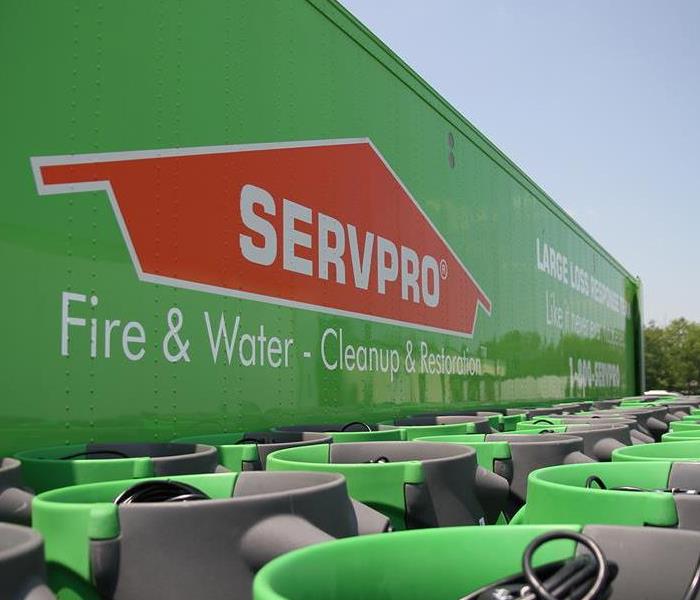 Large loss teams across the nation are ready to roll when the call comes in
Large loss teams across the nation are ready to roll when the call comes in
When disaster strikes, whether from wildfires, hurricanes, or severe storms, the aftermath can be overwhelming. Homes, businesses, and entire communities are left grappling with the damage. But in these moments of uncertainty, call SERVPRO®. With our decades of experience in disaster recovery, we are ready to respond quickly, restore your property, and help you rebuild.
24/7 Emergency Response
Disasters don't wait for business hours, and neither do we. SERVPRO’s teams are available 24/7 to ensure we arrive on-site as soon as it’s safe. Whether it’s wildfire damage, storm flooding, or wind destruction, our goal is to start the recovery process immediately to minimize further damage.
Wildfires: Restoring What’s Lost
Wildfires can leave behind more than just scorched earth. Smoke damage, soot, and the lingering smell of burnt materials are common in homes and businesses even miles from the blaze. SERVPRO is trained in **specialized cleaning techniques** to address:
**Smoke and soot damage**: Both can impact walls, ceilings, and personal items, requiring expert cleaning and restoration.
**Air quality control**: We use state-of-the-art equipment like **air scrubbers** and **ozone machines** to remove the smell of smoke.
**Water damage from firefighting efforts**: Water used to extinguish flames often creates a secondary disaster. We have the expertise to handle both fire and water damage at the same time.
Storms and Flooding: Fast and Efficient Water Damage Recovery
Torrential storms, hurricanes, and floods can cause severe water damage, which worsens the longer it goes untreated. At SERVPRO, we specialize in:
**Water extraction**: Using powerful pumps and vacuums, we quickly remove standing water to prevent further structural damage.
**Drying and dehumidification**: Moisture can seep into walls, floors, and furniture. We use industrial-grade dehumidifiers and air movers to thoroughly dry affected areas.
**Mold prevention**: If water damage isn't addressed quickly, mold can begin to grow within 24-48 hours. Our teams work to ensure that mold doesn’t take hold after a disaster.
Storm Damage Repair and Reconstruction
In addition to water damage, severe storms can cause structural issues, from fallen trees and broken windows to roof damage. SERVPRO is a **one-stop solution**, offering **reconstruction services** after the initial cleanup. This means we can help repair, rebuild, and restore your property to pre-disaster condition, saving you the hassle of working with multiple contractors.
Why SERVPRO?
**Highly Trained Technicians**: Our team is certified by the **Institute of Inspection Cleaning and Restoration Certification (IICRC)** and equipped with advanced tools and technology.
**Locally Owned, Nationally Supported**: Each SERVPRO franchise is locally owned and operated, meaning you get the personal touch of a small business with the resources and support of a national network.
**Faster to Any Disaster**: Our nationwide network allows us to respond quickly, no matter how widespread the damage.
Prepare for the Unpredictable
While you can’t always predict when disaster will strike, you can plan for it. SERVPRO offers Emergency Ready Plans (ERP), a free tool designed to help you and your business be better prepared. With an ERP in place, you'll have an immediate plan of action, helping you minimize downtime and get back to normal faster
When wildfires, storms, or other disasters hit, SERVPRO is the team to call. We’ll work around the clock to restore your property and peace of mind. Call us today to learn more about how we can assist you in the event of a disaster.
How we can help in the event of a major loss or disaster
8/5/2024 (Permalink)
 SERVPRO's large loss team is ready to mobilize across the nation.
SERVPRO's large loss team is ready to mobilize across the nation.
SERVPRO® Has a Large Loss Team that Leads the Charge During Major Disasters:
When disaster strikes, the aftermath can be overwhelming. From natural calamities like hurricanes, floods, and wildfires to large-scale industrial accidents, the damage can be extensive and complex. This is where SERVPRO's Large Loss Team comes into play, providing expert assistance and swift action to restore and recover communities and businesses in the face of major disasters.
What is SERVPRO’s Large Loss Team?
SERVPRO’s Large Loss Team is a specialized division within SERVPRO Industries, a leader in the cleanup and restoration industry. This elite group is composed of highly trained professionals who are equipped with the skills, knowledge, and resources to handle the most challenging and extensive loss events. Their mission is to provide seamless service and quick recovery, minimizing the disruption caused by major disasters.
Expertise and Capabilities:
Comprehensive Disaster Response
SERVPRO’s Large Loss Team is adept at managing a wide range of disaster scenarios. Whether it’s water damage from flooding, fire and smoke damage, or storm-related destruction, the team has the expertise to tackle it all. They are equipped with state-of-the-art technology and equipment, ensuring efficient and effective restoration.
Rapid Mobilization
Time is of the essence during major disasters. SERVPRO’s Large Loss Team is known for its rapid response and mobilization capabilities. With strategically located resources and personnel, they can quickly deploy to affected areas, providing immediate relief and beginning the restoration process without delay.
Customized Solutions
Every disaster is unique, and so is the approach required to address it. SERVPRO’s Large Loss Team works closely with clients to develop tailored solutions that meet their specific needs. This personalized approach ensures that every aspect of the restoration process is handled with precision and care.
Notable Deployments:
Hurricane Response
When hurricanes devastate coastal regions, the aftermath can leave communities reeling. SERVPRO’s Large Loss Team has been at the forefront of hurricane response efforts, assisting in the recovery of homes, businesses, and public infrastructure. Their efficient and coordinated efforts help to restore normalcy in the shortest time possible.
Wildfire Recovery
Wildfires can cause widespread destruction, leaving behind charred landscapes and damaged properties. SERVPRO’s Large Loss Team has extensive experience in wildfire recovery, providing critical services such as debris removal, smoke damage restoration, and structural repairs. Their expertise ensures that affected areas are restored to their pre-disaster condition.
Industrial Accidents
Large-scale industrial accidents can pose significant challenges due to the complexity of the damage and the need for specialized remediation. SERVPRO’s Large Loss Team is equipped to handle such situations, offering comprehensive restoration services that address both immediate and long-term recovery needs.
Commitment to Excellence:
Training and Certification
The members of SERVPRO’s Large Loss Team undergo rigorous training and hold certifications from recognized industry organizations. This commitment to continuous education ensures that they are always at the forefront of best practices and emerging technologies in the restoration industry.
Customer-Centric Approach
At the heart of SERVPRO’s operations is a dedication to customer satisfaction. The Large Loss Team works closely with clients, maintaining open communication and providing regular updates throughout the restoration process. This customer-centric approach ensures transparency and builds trust during challenging times.
In the face of major disasters, the importance of having a reliable and capable restoration partner cannot be overstated. SERVPRO’s Large Loss Team stands out as a beacon of hope and efficiency, offering unparalleled expertise and rapid response to restore communities and businesses. Their unwavering commitment to excellence and customer satisfaction makes them a trusted ally during the most challenging times.
How SERVPRO® Can Help With Storm Damage
2/26/2024 (Permalink)
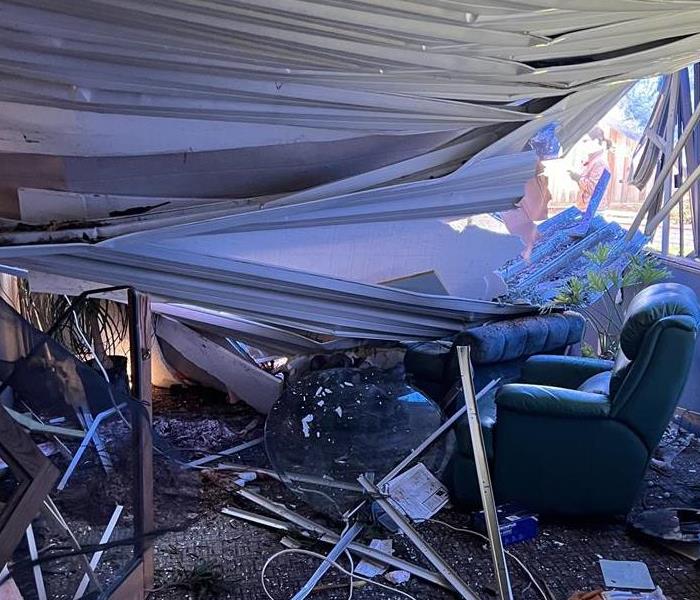 A house was severely damaged by recent storms.
A house was severely damaged by recent storms.
SERVPRO® is a company that specializes in disaster restoration and cleanup services, including those related to major storms and natural disasters. Here's how SERVPRO can help you after a major storm:
1. **Emergency Response:** SERVPRO offers 24/7 emergency response services. They understand the urgency of the situation after a major storm and can quickly deploy teams to assess the damage and begin the restoration process.
2. **Damage Assessment:** The first step involves a thorough assessment of the property to determine the extent of the damage. This includes identifying areas affected by water, wind, or other storm-related issues.
3. **Water Removal and Drying:** If the storm has caused flooding, SERVPRO has the equipment and expertise to remove standing water and thoroughly dry affected areas. This helps prevent further damage and reduces the risk of mold growth.
4. **Mold Remediation:** In the aftermath of a storm, mold can become a significant concern, especially if there's been water damage. SERVPRO can address mold issues through proper remediation techniques, including cleaning and sanitizing affected areas.
5. **Storm Damage Cleanup:** This involves the removal of debris, damaged materials, and any hazards left behind by the storm. SERVPRO ensures a safe and thorough cleanup process.
6. **Restoration Services:** Once the cleanup is complete, SERVPRO can start the restoration process. This may involve repairing or replacing damaged structures, flooring, walls, and other components to return the property to its pre-storm condition.
7. **Content Cleaning:** If personal belongings or contents have been damaged, SERVPRO offers content cleaning services. This includes cleaning, deodorizing, and restoring salvageable items.
8. **Insurance Coordination:** SERVPRO can work with your insurance company to streamline the claims process. They provide documentation of the damage and the restoration work done, helping you navigate the insurance claims process more efficiently.
9. **Building Services:** In addition to cleanup and restoration, SERVPRO provides building services. This may involve reconstruction, repairs, and other construction-related tasks to restore the property fully.
10. **Experience and Expertise:** SERVPRO has extensive experience in dealing with a variety of disasters, including major storms. Their trained and certified technicians use advanced equipment and follow industry best practices to ensure effective and efficient restoration services.
If you've experienced significant damage due to a major storm, contacting SERVPRO can help expedite the recovery process and minimize the long-term impact on your property.
SERVPRO® Can Save You From The Rain
2/2/2024 (Permalink)
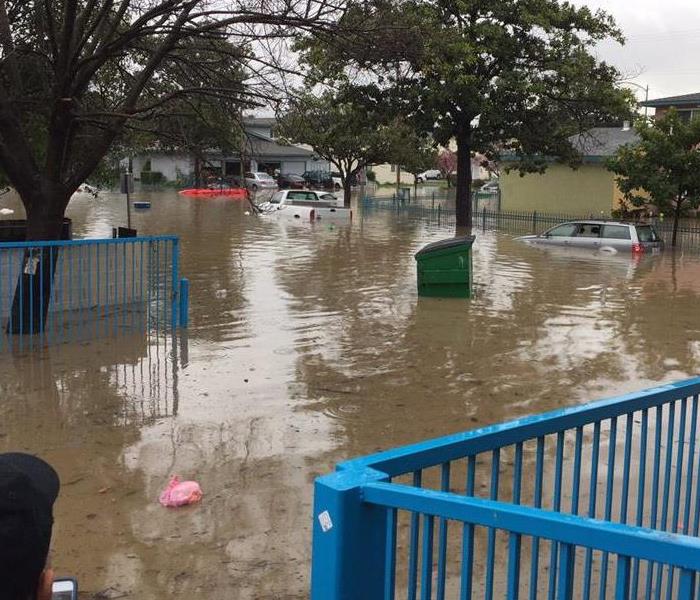 Heavy rains cause major damages in San Jose
Heavy rains cause major damages in San Jose
SERVPRO® is a professional restoration and cleaning service that can assist you in the event of rain-related damage to your property. Here are some ways in which SERVPRO® can help:
1. **Water Damage Restoration:**
- If your property experiences flooding or water damage due to heavy rain, SERVPRO® can provide water extraction services to remove standing water.
- They use advanced equipment such as pumps, dehumidifiers, and air movers to thoroughly dry the affected areas.
2. **Mold Remediation:**
- Excessive rain and moisture can lead to mold growth. SERVPRO® offers mold remediation services to assess and address any mold issues in your home or business.
3. **Storm Damage Cleanup:**
- Rainstorms can cause various types of damage, including roof leaks, broken windows, and structural damage. SERVPRO® can assist in cleaning up and repairing these damages.
4. **Document Drying:**
- If you have important documents or valuable items that are damaged by rainwater, SERVPRO® provides document drying services using specialized techniques to salvage and restore these items.
5. **Carpet and Upholstery Cleaning:**
- Rainwater can soil carpets and upholstery. SERVPRO® offers professional cleaning services to restore and refresh these items.
6. **Emergency Response:**
- SERVPRO® is available 24/7 for emergency response. If you experience rain-related damage, you can contact them, and they will dispatch a team promptly to assess the situation and begin the restoration process.
7. **Insurance Coordination:**
- SERVPRO® can work with your insurance company to streamline the claims process and ensure a smooth and efficient restoration experience.
It's important to note that the specific services offered may vary depending on the franchise location and the nature of the damage. If you are facing rain-related issues, contacting SERVPRO® office is advisable to discuss your specific needs and receive personalized assistance.
The Role of SERVPRO® Plays in Storm Damage Recovery
9/18/2023 (Permalink)
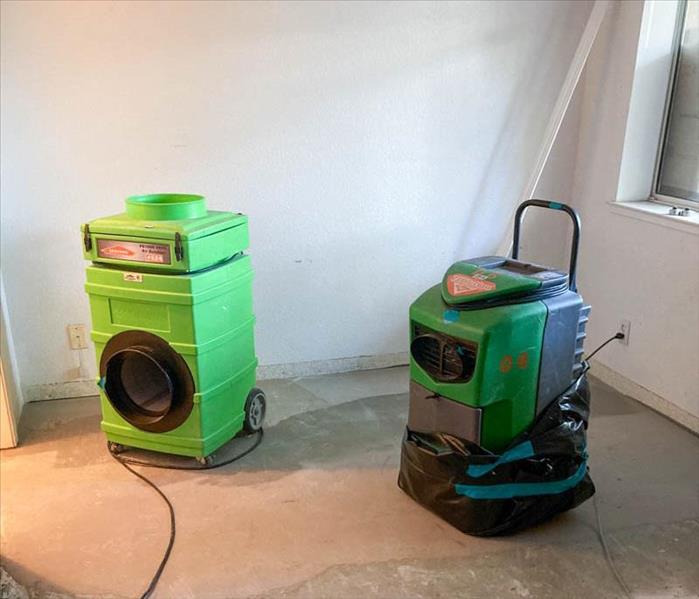 When it comes to storm damage recovery in the Campbell area, our SERVPRO team is your go-to choice.
When it comes to storm damage recovery in the Campbell area, our SERVPRO team is your go-to choice.
When storms wreak havoc on homes and businesses, the road to recovery can seem daunting. That's where SERVPRO® steps in as your trusted ally in storm damage recovery. As the leading restoration company in Campbell, CA, SERVPRO understands the unique challenges that come with storm damage and is well-equipped to help you navigate through the restoration process.
Understanding the Types of Storm Damage
Storms can cause various types of damage, including floods, water intrusion, wind damage, and structural issues. Our SERVPRO's team of experts is trained to identify and address each type of damage effectively. Whether it's extracting water, drying out affected areas, or repairing structural elements, SERVPRO's expertise ensures a comprehensive restoration.
Immediate Response and Assessment
Time is of the essence when dealing with storm damage. SERVPRO recognizes the urgency and prides itself on providing a swift response to your call. Upon arrival, our team conducts a thorough assessment to evaluate the extent of the damage. This assessment serves as the basis for developing a customized restoration plan tailored to your specific needs.
Professional Cleanup and Restoration
With advanced equipment and techniques, our team ensures an efficient cleanup and restoration process. Our skilled technicians employ state-of-the-art water extraction and drying methods to eliminate excess moisture and prevent further damage. In instances where mold growth has occurred due to prolonged exposure to water, our crew can address mold remediation as part of the restoration process. Furthermore, our team is capable of handling structural repairs, making sure your property is restored to its pre-storm condition.
Collaborative Insurance Claims Process
Navigating insurance claims after storm damage can be overwhelming. SERVPRO simplifies this process by working closely with insurance companies. Our team assists with documentation, communicates directly with adjusters, and ensures a seamless claims process, providing you with peace of mind during the restoration journey.
Contact and Service Area
SERVPRO is proud to serve the Campbell, CA, area. If you require storm damage recovery assistance, don't hesitate to reach out to us. You can contact our dedicated team at (408) 371-4001 or check out our website for more information.
When it comes to storm damage recovery in the Campbell area, our SERVPRO team is your go-to choice. With our expertise, prompt response, and commitment to customer satisfaction, we are dedicated to helping you restore your property after a storm. Trust SERVPRO of Campbell as your reliable restoration partner and let us mitigate the damage, so you can focus on rebuilding and moving forward.
Essential Steps to Prepare Your Commercial Building for Bad Weather in California
6/14/2023 (Permalink)
 Preparing your commercial building for bad weather in California is crucial for minimizing risks and protecting your assets.
Preparing your commercial building for bad weather in California is crucial for minimizing risks and protecting your assets.
As a business owner in California, it's crucial to prepare your commercial building for the potential impact of bad weather events. California's diverse climate presents various weather challenges, including storms, wildfires, and earthquakes. Taking proactive measures to protect your commercial property can minimize damage, ensure employee safety, and maintain business continuity. In this blog, we will provide you with valuable tips on how to prepare your commercial building for bad weather in California.
Understand Potential Weather Risks
Start by understanding the specific weather risks associated with your location in California. Research historical weather data, consult local meteorological resources, and stay informed about weather forecasts. Identify common threats such as heavy rainstorms, high winds, heat waves, wildfires, or seismic activity that may affect your area. This knowledge will help you tailor your preparations accordingly.
Create an Emergency Response Plan
Develop a comprehensive emergency response plan for your commercial building. Assign responsibilities to key staff members, designate evacuation routes, and establish communication protocols. Include procedures for sheltering in place, securing important documents, and shutting down critical systems if necessary. Regularly review and practice your emergency response plan to ensure everyone is prepared and aware of their roles during a weather-related event.
Perform Regular Maintenance and Inspections
Regular maintenance and inspections are essential to identify potential vulnerabilities in your commercial building. Check and repair the roof, gutters, and downspouts to prevent leaks and water damage. Ensure proper drainage around the property to mitigate the risk of flooding. Inspect windows, doors, and exterior walls for gaps or cracks that could compromise the building's integrity during high winds. Regularly service HVAC systems and electrical equipment to minimize the risk of malfunctions.
Secure Outdoor Areas and Equipment
Take measures to secure outdoor areas and equipment that may be vulnerable to bad weather. Trim overhanging branches or remove trees that pose a risk of falling during storms. Secure loose objects, signage, and outdoor furniture to prevent them from becoming projectiles in high winds. If applicable, consider installing storm shutters or protective coverings for windows and doors.
Backup Important Data and Systems
Ensure that your critical data and systems are backed up and protected. Regularly back up your important files, documents, and data to an off-site location or cloud-based storage. Implement surge protectors and uninterruptible power supply systems to safeguard sensitive electronic equipment. Consider investing in a generator to maintain an essential power supply during an outage.
Communicate and Educate Employees
Effective communication is vital during bad weather events. Keep your employees informed about weather updates, emergency procedures, and evacuation plans. Conduct training sessions to educate your staff on how to respond to different weather scenarios and emphasize the importance of their personal safety. Encourage open communication channels so that employees can report any concerns or potential hazards.
Preparing your commercial building for bad weather in California is crucial for minimizing risks, protecting your assets, and ensuring the safety of your employees and customers. By understanding potential weather risks, creating an emergency response plan, performing regular maintenance, securing outdoor areas, backing up data, and communicating effectively with your employees, you can enhance your readiness and resilience in the face of adverse weather events.
At SERVPRO of Campbell, we understand the importance of proactive preparation and offer professional disaster restoration and recovery services for commercial buildings. Our experienced team is equipped to handle the aftermath of weather-related incidents, providing efficient and comprehensive restoration solutions to get your business back on track.
5 Types of Damages from a Storm
2/11/2023 (Permalink)
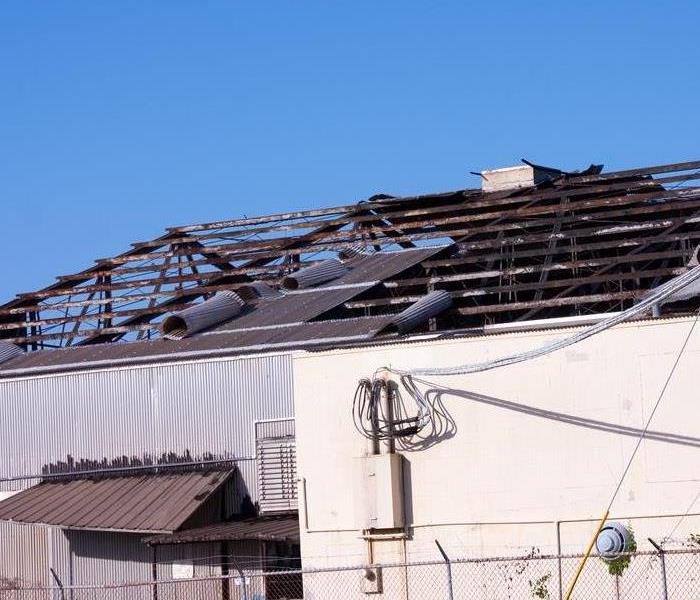 When your property suffers roof damage, give us a call.
When your property suffers roof damage, give us a call.
You've probably seen the news and thought to yourself that it would be pretty bad to have a storm come through your town. But did you know that storms can cause significant damage to buildings and property? There are several types of damages caused by storms, including roof damage, broken windows, water damage and debris littering the premises.
Roof damage
If you’re dealing with a roof that has been damaged by a storm, it can cause structural damage to your house and lead to interior problems problems. It can also lead to electrical problems. The most common types of roof damage include:
- Water damage – water leaks into the ceiling and walls, causing mold and mildew.
- Electrical problems – lightning strikes during stormy weather could cause your electrical system to fail or start fires.
Broken windows
Broken windows are a common occurrence during storms. Broken windows can cause water damage, which can lead to more damages in your home if a professional is not called immediately. Broken windows can also be dangerous for pets, who could get stuck or injured by broken glass shards.
Water damage
Water damage is one of the most damaging types of storm-related damage. It can be caused by broken pipes, burst water heaters, and flooding. Water damage can cause mold and mildew to grow in your home. Wood will rot if you don’t address it quickly after the storm has passed through your area. Electrical systems may fail due to water damage as well as flooring that warps from being saturated with too much moisture from rainfall or floodwaters
Debris littering the premises
Debris is one of the most common damage caused by storms, and it can be dangerous for you and your property. Debris may include tree limbs, roofing materials, doors, tables and furniture. Each piece of debris can cause injury to people or damage to property. Additionally, they create a fire hazard if they are left in place too long after a storm has passed through an area. It is important that these items be removed as soon as possible so they do not present additional risks to those who live in the area or visit it after the storm has occurred.
Commercial and Residential Property
In addition to causing damage to houses and other residential structures, severe storms can also cause damage to commercial buildings. The same forces that cause roof shingles and siding to blow off a home will also rip the roof off of a commercial building, or even completely destroy it. Since most commercial buildings are constructed with concrete walls and steel beams, they don't have much flexibility when they're hit by strong winds—and this means that if you're living above a strip mall or shop in an area that's prone to severe weather, there's a good chance your building could be damaged by high winds.
Inspect Your Building for Signs of Damage
In order to get an idea of what kind of repairs might be necessary after the storm passes through your area or if it hasn't passed through yet, take some time before the storm arrives so that you can inspect any problems areas on your property where water may leak inside during heavy rains or floods such as around windows.
It is important to know what kind of damage your building has sustained and how you can mitigate it. Give the professionals a call to quickly assess the damage of your home or business property to help reduce doors closed or excessive expense to your pocket book.
What To Do After Flooding If You Don’t Have Flood Insurance
7/29/2022 (Permalink)
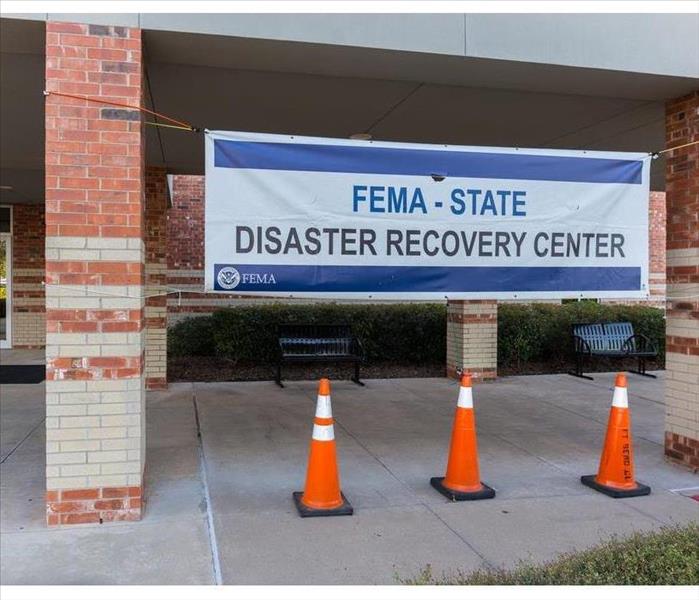 FEMA can provide four types of assistance.
FEMA can provide four types of assistance.
What to Do If You Don't Have Flood Insurance After a Flood
Homeowners insurance policies typically exclude damage caused by flooding. Residents of flood-prone areas should obtain a separate flood insurance policy, otherwise they will have to pay for damage restoration out of pocket or obtain relief through a federal program. Here are four types of assistance that may be available through the Federal Emergency Management Agency.
1. Transitional Sheltering and Temporary Housing
After the president declares a federal disaster area, Transitional Sheltering Assistance can lower the cost of staying in a hotel during the days or weeks immediately following a disaster. Homeowners can also seek Temporary Housing Assistance for a period of one month up to 18 months.
2. Grants for Cleanup and Restoration
A homeowner may want to apply for a grant to fund the restoration of a residence located on a flood plane. Grants can be used for repairing structural damage or replacing other losses.
3. Repair and Replacement Assistance
If the location of your home is declared a federal disaster area, you may be eligible for a one-time payment for Repair and Replacement Assistance. This option will not cover the costs of flood damage, and is intended to supplement a flood insurance policy.
4. Low-Interest Loans
It may be possible to obtain loans that have low interest rates to finance residential flood damage repairs. These loans are usually capped at $200,000 for a primary residence and $40,000 for property including renters' losses. Annual interest rates may be as low as 1.75 percent for a 30-year period.
After a federal declaration of emergency, homeowners may benefit from these and other services administered by FEMA. If you obtain flood insurance, you should seek an estimate from storm and water damage restoration experts and make a claim. Professional cleanup and rebuilding services can reduce the likelihood that secondary damage will result from primary flood damage at a residence in San Jose, CA.
What To Do If Your Bathtub or Toilet Overflows
6/2/2022 (Permalink)
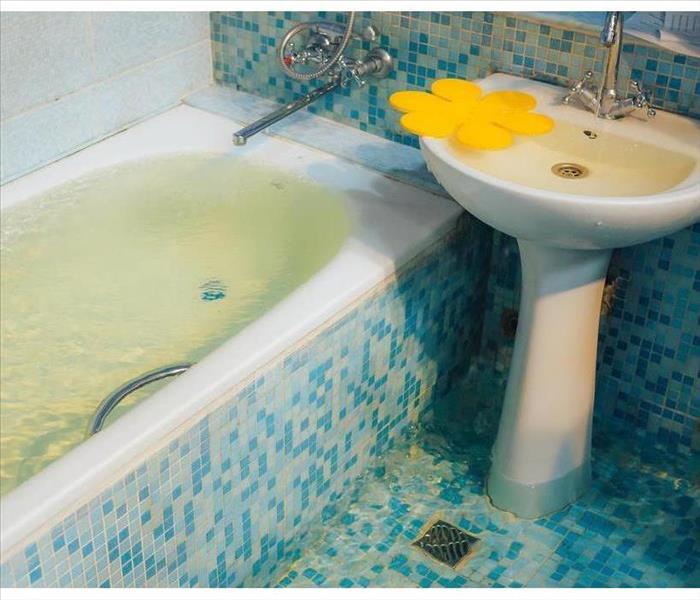 Overflowing water in your bathroom can be the result of a sewer backup.
Overflowing water in your bathroom can be the result of a sewer backup.
Sewer Backup In Your Bathroom
Plumbing issues can happen to any homeowner. There are several reasons that this can occur, including broken pipes, a clog or blockage, and severe weather in Los Gatos, CA. If you are experiencing a sewer backup in your bathroom, there are a few steps you should take.
1. Turn Off the Water
One of the first things you should do during a toilet or bathtub backup is turn off the water source to your house. This will help limit the amount of water that enters the building. Continuing to use the plumbing can contribute to the overflow.
2. Move Belongings to a Dry Space
Dry items that have not been touched by the overflowing water should be moved to another location to keep them safe. Do not move anything that has been contaminated into a clean area. If there is an excessive amount of water in the room, do not enter it without protective clothing. Water from a sewer backup is highly-contaminated and unsafe.
3. Contain the Flooding Area
Depending on how badly the plumbing fixtures are overflowing, the contaminated water could start to flow into other areas. To keep the water from moving into the rest of the house, block off the bathroom the best you can.
4. Contact a Professional
If you are struggling to take care of the issue on your own, don’t hesitate to contact a professional. A water damage remediation company will be much better equipped to handle sewage water than you are. They can clean it up safely, make necessary repairs and locate the source of the problem as well.
Overflowing water in your bathroom can be the result of a sewer backup, causing contaminated water to enter your home. There are steps that you can take to keep your belongings and home from additional damage, but these should only be done if it is safe for you to do so. Because this water is unsafe to handle without protective gear, contacting a professional is often a better approach than attempting to clean it on your own.
5 FAQs About Flood Insurance
4/26/2022 (Permalink)
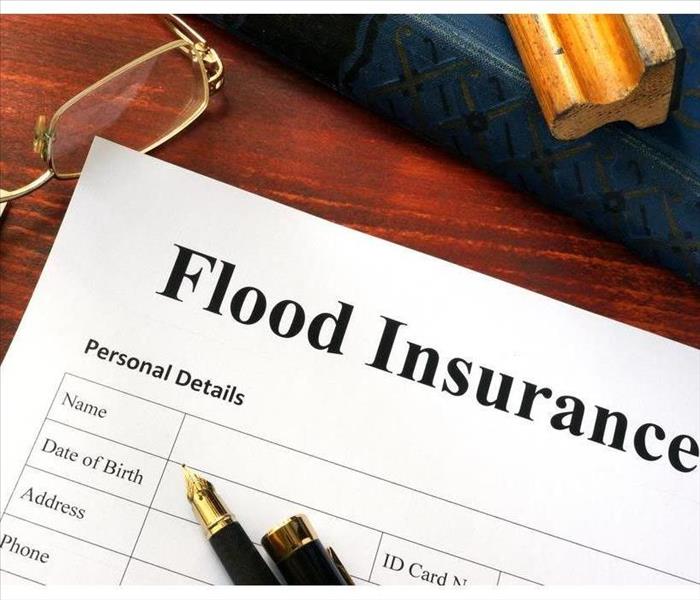 Flood insurance is a policy you can get to offer protection for your business against flood damage.
Flood insurance is a policy you can get to offer protection for your business against flood damage.
Five Flood Insurance Frequently Asked Questions
Some areas practically require a flood policy. In other areas, business owners may not have even heard of flood insurance. If you're in this category, you probably have a lot of questions. Here is some information that can help answer your questions.
1. What Is It?
Flood insurance is a policy you can get to offer protection for your business against flood damage. It is either an add-on or a separate policy from your standard commercial insurance policy, which won't cover flood damage.
2. What Does It Cost?
On average, flood insurance for small businesses in Santana Row, CA, is roughly $1,000 per year. However, what you end up paying for your policy is based on your deductible, how much coverage you want, and your risk levels.
3. Is It Necessary?
You may never actually need your flood insurance. In these cases, you may feel like you are wasting your money on commercial insurance when you could be investing it in new equipment or other items. However, if you don't have flood insurance and you experience flood damage, your business could go underwater trying to pay to repair the damage.
4. How Do You Buy It?
To purchase a policy, you're going to need to talk to your commercial insurance agent. You can also search for alternative providers who offer flood insurance. Before reaching out to an agent, ensure your business meets the requirements for the recommended policy. Pick a company that offers a policy in your price range that covers all of your equipment.
5. Are Elevation Certificates Important?
In high-risk zones, elevation certificates are used to calculate the potential costs of hiring a storm remediation company. These are important because they tell your insurer your elevation, compared to typical floodwater heights.
Ultimately, whether you purchase flood insurance should be based on your comfort level with your current FEMA risk zone. However, you could end up in a situation where you need it to prevent your business from failing.
What Is a Flood Cut and Why Is It Necessary?
4/16/2022 (Permalink)
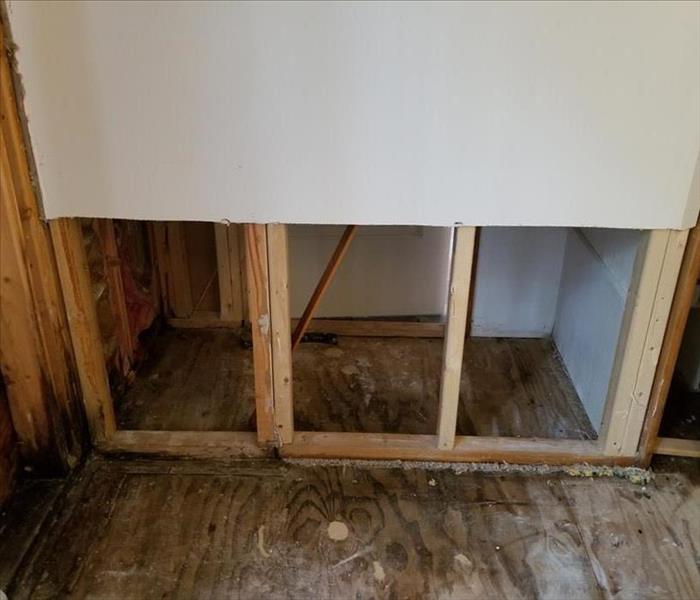 In some instances, a flood cut will need to be made to properly restore the function of your building.
In some instances, a flood cut will need to be made to properly restore the function of your building.
If you have experienced flooding in your commercial building, it may be necessary for the restoration company to perform a flood cut. This is probably an unfamiliar term for most business owners, so this guide will provide a brief explanation of what it is and why it is done.
What a Flood Cut Is
When a water restoration company in West Valley, CA, needs to cut the drywall in your building, this is called a flood cut. The reason this is called a flood cut is that the cut is made 12-18 inches above where the flood damage stops. It is done to facilitate drywall tear-out. A flood cut may be performed in a variety of situations:
- Wall has been touched by sewage water
- Damage is too severe to save the wall
- It isn't practical to dry out the wall without removing sections
When a Flood Cut Is Necessary
Flooding sometimes causes sewer lines to back up which can lead to your building being exposed to contamination. A wall that has been contaminated by sewage can not be salvaged because the materials may contain harmful bacteria or pathogens. Additionally, a flood cut needs to be performed on walls that contain insulation, because insulation can not be dried out and still function properly as insulation.
Situations That Do Not Require a Flood Cut
If the water that damaged the wall was from a clean source, such as a pipe leak, and there is no insulation, the restoration company may be able to salvage the wall by using an injection system to dry out the inside of the wall without cutting the drywall. Most restoration companies will make every effort to salvage as much property as possible.
When a building has been damaged by flooding, restoration services will work with you to attempt to salvage your property. However, in some instances, a flood cut will need to be made to properly restore the function of your building.
4 Tips for Maintaining a Commercial Roof
4/11/2022 (Permalink)
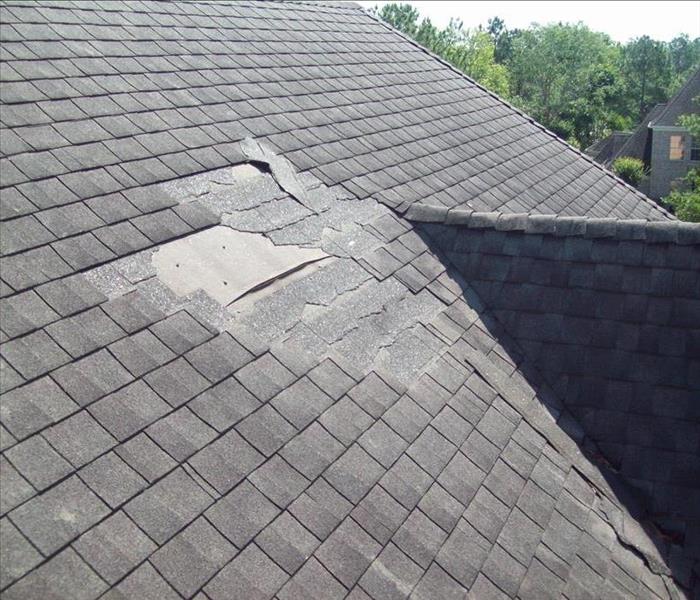 Missing shingles on a roof.
Missing shingles on a roof.
Four Commercial Roof Maintenance Tips
A roof is something that can easily be overlooked, but your Monte Sereno, CA, property relies on it to keep everything underneath it safe and dry. Once roof damage happens, it may mean more than needing a roof rebuild. Missing shingles, damaged membranes and other issues lead to issues that may require the services of water damage and restoration professional. Although the unexpected can happen, the following four tips make it easier for your roof to weather the storms.
1. Preventive Maintenance
The top way to avoid roof damage is to stay on top of maintenance. Business owners should regularly check for any leaks, standing water and blocked drains. These often lead to other issues. Any signs of missing pieces indicate there may be hidden trouble lurking.
2. Regular Inspections
Along with visibly checking the roof, it should be professionally inspected annually. A professional will have the expertise to look for other issues, such as weak spots, sagging and structural issues. Scheduling this inspection may mean the difference between an inexpensive repair and a costly new roof.
3. Keep It Clean
Especially after a storm, it is important to check for wind damage and ensure the roof is clean of leaves and branches. Along with potentially clogging a drain, debris piling up invites the growth of algae. If that happens, it can start to deteriorate the roof faster. It may also lead to mold growth.
4. Inspect Roof Equipment
Most commercial properties have some time of equipment on the roof. Whether an HVAC unit, ventilation, or skylights, these items should be regularly checked to ensure they are functioning properly. If any damage is discovered, repairs should be immediately made to avoid a leak.
Although Mother Nature may eventually lead to some kind of roof damage, staying on top of maintenance and inspections increases the chances of the roof lasting longer.






 24/7 Emergency Service
24/7 Emergency Service











